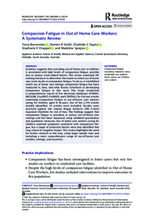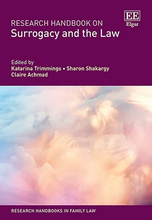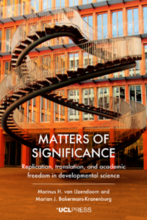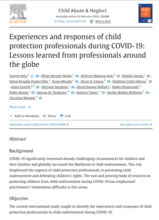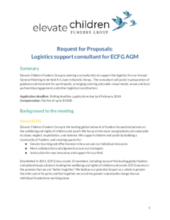Displaying 351 - 360 of 4424
Evidence suggests that providing out-of-home care to children is associated with high levels of compassion fatigue, possibly due to various work-related factors. This global systematic review examined the existing literature to determine the extent to which out of home care work results in compassion fatigue. To do so, it established which out of home care settings compassion fatigue has been measured in, how, and what factors contribute to developing compassion fatigue in this work.
This essential Research Handbook provides a multifaceted exploration of surrogacy and the law, examining a variety of critical yet under-researched perspectives including globalisation, power, gender, sexual orientation, genetics, human rights and family relations.
In Matters of Significance, Marinus van IJzendoorn and Marian Bakermans-Kranenburg draw on 40 years of experience with theoretical, empirical, meta-analytic and translational work in child development research to highlight the complex relations between replication, translation and academic freedom. They argue that challenging fake facts promulgated by under-replicated and under-powered studies is a critical type of translation beyond technical applications.
The current international study sought to identify the experiences and responses of child protection professionals to child maltreatment during COVID-19.
The ISCI 2024 Conference on ‘Global Childhoods: Critical Perspectives Promoting Theoretical, Empirical and Policy Understandings’ seeks to examine government policies and programs that have succeeded in promoting the well-being of children.
This publication is meant to guide the collection of reliable, internationally comparable data on key ECD indicators, the selection of which was informed by the Nurturing Care Framework.
Dr. Charlyn Harper Browne, Senior Fellow at Center for the Study of Social Policy (CSSP), will provide an overview of the newly released paper, "Expanding the Perspectives and Research Foundation for Strengthening Families and Youth Thrive," share updated definitions of the protective factors, and preview other new materials coming soon.
Elevate Children Funders Group (ECFG) seeks a consultant to support the logistics coordination for our Annual General Meeting to be held 4-6 June 2024 in Nairobi, Kenya. Local candidates will be prioritized.
Rolling review, applications due by 8 February 2024.
On 7 February 2024, the Global Social Service Workforce Alliance hosted a webinar to showcase the findings from their recently released 2023 State of the Social Service Workforce Report: A Decade of Progress, A Future of Promise.
The Global Social Service Workforce Alliance invites you to join them for an upcoming webinar, in which they will showcase the findings from their recently released 2023 State of the Social Service Workforce Report: A Decade of Promise a Future of Promise. They will delve into the report's insights, highlighting the significant progress that has been made to strengthen the social service workforce over the past decade and noting key priorities that must be considered when looking towards the future of workforce strengthening.

